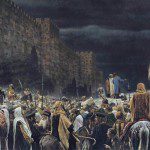After reading bleak reports this morning of water protectors blasted by water cannons in freezing temperatures and white supremacists lifting Nazi salutes and yet more human dangers to sea turtles, I thought of these lines from W.H. Auden’s stirring poem, “In Memory of W.B. Yeats”:
. . .
Follow, poet, follow right
To the bottom of the night,
With your unconstraining voice
Still persuade us to rejoice
…
The great poets, he suggests, venture into the darkness and speak into it, not with rants or tirades, but with truths that take us to a deeper and wider place than despair. Auden’s poem commemorates one of them whose “Second Coming,” written in 1913, spoke a prophetic word that echoed down the dark corridors of the 20th century with its “blood-dimmed tides” that drowned “the ceremony of innocence.”
Rejoice is a word with strong biblical echoes: “You shall rejoice before the Lord your God”; “Rejoice greatly, O daughters of Jerusalem”; “Let those who seek the Lord rejoice”; “Let your saints rejoice in your goodness”; “my heart shall rejoice in your salvation”; “my spirit rejoices in God, my Savior.” But rejoicing doesn’t come easily or even naturally in time of loss, dread, or fear, which is where many now find themselves as winter descends and the homeless are cold and unnerving implications of the recent election continue to unfold. We must sometimes be persuaded to, as Wendell Berry put it, “be joyful, though you have considered all the facts.”
All the facts are hard to take in right now, especially with increasing attention to how much “fake news” contaminates the airwaves and the internet. And once we have sifted them, with the help of trustworthy journalists and thoughtful analysts and a little help from our friends, lament may seem more appropriate to the moment. Lament is important. The glib who too hastily urge joy upon the sorrowing do more harm than good.
But in this same tribute to Yeats, Auden urges in the midst of mourning, “Let the healing fountain start.” And Eliot ends his Four Quartets with an echo of Julian of Norwich’s puzzling promise, “All shall be well, and all manner of thing shall be well.” And Maya Angelou, in the inauguration poem that also spoke of perpetual bloodshed wrote, “Lift up your faces, you have a piercing need / For this bright morning dawning for you.” None of these poets recoiled from darkness; in fact they articulated foreboding memorably and forcibly. But they also understood that the poet’s work is to equip us to dwell in paradox—some of it bewildering and painful—and to embrace the lives we are given, not with abject submission, but with the wisdom that seeks blessing in unlikely places.
It takes courage to invite us into the unsettling places of political awareness and to hold up a mirror to our own hard hearts—our own self-serving judgments, the fears behind our anger. And it takes courage to accept the invitation, to take stock of the world around and the world within, read the morning news, acknowledge that the way through the thicket is laced with thorns, and still allow ourselves to be persuaded, against all odds, to rejoice.
There is joy for today in the birth of a friend’s child, in a choir concert, in a refugee’s success story, in volunteers gathering to distribute food, in lectionary readings and centering prayer that guides us into the “white light, still and moving.” And in poems that linger in the mind and on the tongue, scenting the air with hope, even in the worst of times.















